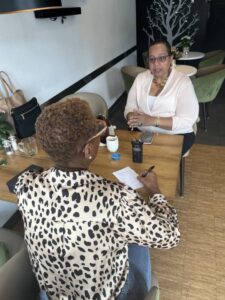There is a lot of interest among single mothers from Curaçao in becoming independent entrepreneurs without personnel (ZZP’ers, Zelfstandige Zonder Personeel) in the Netherlands, particularly in the province of Groningen. This is the only province that offers a course with a year of guidance to aspiring entrepreneurs.
Contracted by the municipality of Groningen, Danette Hoyer helps interested women start their own businesses. During the training, which lasts six weeks and includes nine workshops, Danette guides participants through various activities, such as writing a business plan. She has lived in Groningen for 36 years and studied Social Legal Services, Psychology, and Law.
Welfare Benefits
Women, particularly those from Curaçao, are highly motivated, take initiative, are willing to face challenges, and are very organized. Danette explains: “Even though they are single mothers, they manage to organize themselves to follow the course.”
Most participants have been living in the Netherlands for some time, receive welfare benefits, and understand how various provisions and services, such as taxes, work. Others, however, have only recently arrived in the Netherlands and hope to become self-sufficient quickly. “That’s not possible yet,” Danette says, “because they don’t have basic social security, like having a home in their own name.”
Participants who do not receive welfare can still take the course but do not receive a year of guidance from Danette. Most participants finish the guidance program within six months to a year. “After that, I’m no longer in contact with them because their businesses are running well,” says Danette. Once participants earn enough to support themselves and keep their businesses afloat, the guidance and welfare benefits end.
According to Danette, the municipality does not actively recommend entrepreneurship because having your own business carries risks too, for your social wellbeing. For this reason, each person must show sufficient motivation to take on the challenge before the municipality offers support. Participants under Danette’s guidance are still required to apply for jobs, but the government considers that they are following a course.
ZZP’ers
During the course, participants become ZZP’ers. After completing the course, they can choose to hire staff, but in that case, they will no longer receive financial support from the government. Danette shares that participants often find the guidance demanding at first. Over time, however, they feel more comfortable with it.

Participants who do not receive welfare benefits do not receive the additional guidance either. In practice, it has been shown that entrepreneurship comes naturally to Curaçaoans, as if it’s in their blood. On Curaçao, people do not wait around for a bank to grant them a loan to start their businesses. Neither do Curaçaoans in the Netherlands.
The training provided by the municipality of Groningen helps participants discover their skills and talents, which they can then apply in their businesses.
After that, significant attention is given to financial matters. Many participants live on welfare, which is their income to live on. But as ZZP’ers they need to learn how to generate not only an income to live on, but also to sustain their businesses. Other topics covered include commercial skills, social media, and more.
Language and Numbers
The biggest challenges Curaçaoans face on their path to entrepreneurship are the Dutch language and numbers. Danette says that education in Papiamentu does not help participants in the Netherlands. “They read without understanding. Another major obstacle is working with numbers: managing money and bookkeeping are difficult for them.”
Every month, the municipality of Groningen starts a new group for the course to become a ZZP’er. Each group consists of twelve to fifteen participants, and there is a waiting list covering nearly four months.
Danette emphasizes that banks in the Netherlands do not discriminate. If you are willing to work and submit a strong business plan, the bank will provide financing. “In the Netherlands, unlike on Curaçao, it doesn’t matter who you are or where you’re from. If you have a good plan for a profitable project, banks are willing to invest,” Danette concludes.